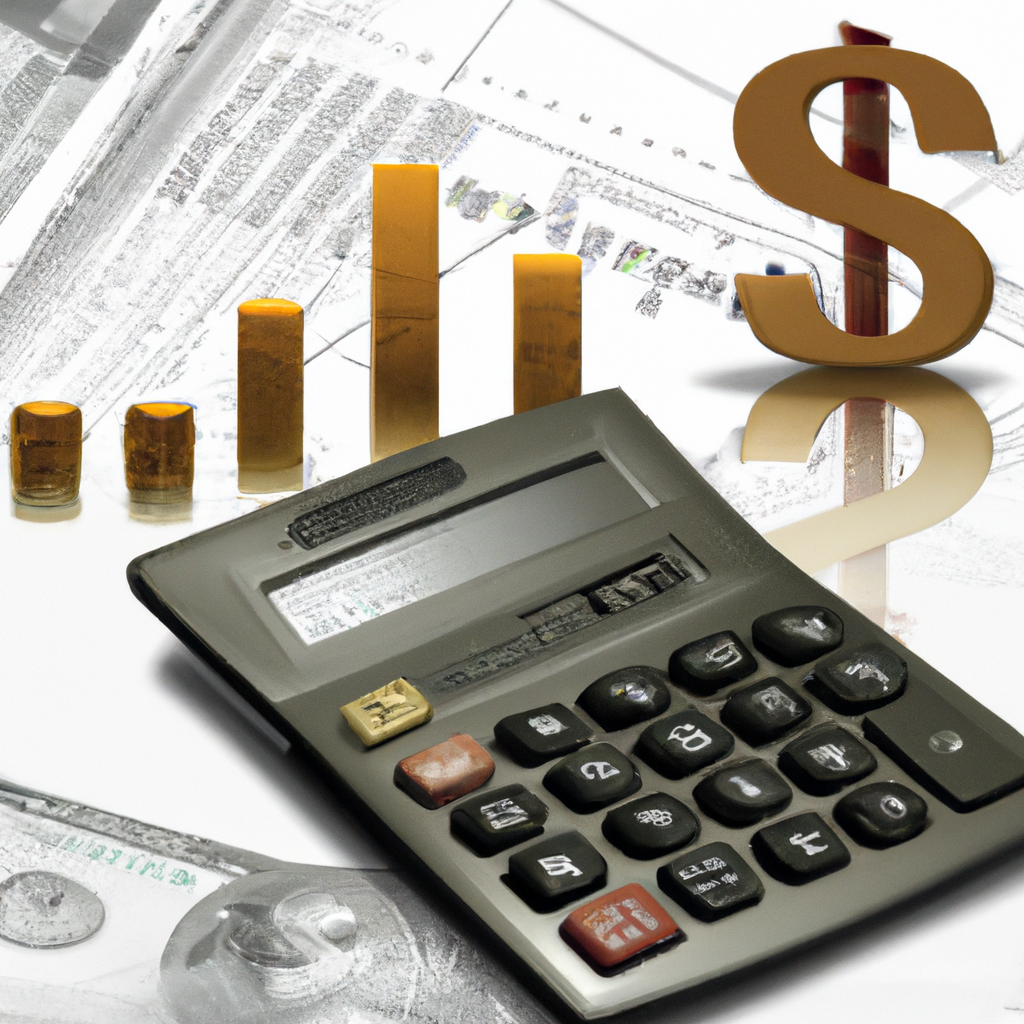Are you wondering whether you should include taxes as a separate category in your budget? Managing your finances can be overwhelming, but understanding how taxes fit into the picture is essential. In this article, we will explore whether accounting for taxes separately in your budget is necessary, and why it can positively impact your financial planning. So, let’s dive in and unravel the importance of tax considerations in your budgeting process.
Understanding the Importance of Accounting for Taxes in Your Budget
Determining the Significance of Taxes in Your Finances
When it comes to managing your personal finances, taxes play a significant role that should not be overlooked. Understanding the importance of accounting for taxes in your budget is crucial for maintaining financial stability and avoiding unnecessary stress. By recognizing the impact of taxes on your budget and incorporating them into your financial plans, you can gain better control over your finances and ensure a secure financial future.
The Impact of Taxes on Your Budget
Taxes have a direct impact on your budget as they represent a portion of your income that needs to be allocated for government obligations. Whether you earn a fixed salary or have fluctuating income throughout the year, taxes can significantly reduce your monthly take-home pay. By failing to account for taxes in your budget, you may find yourself short on funds for other essential expenses or unable to meet your financial goals.
Why It’s Essential to Include Taxes in Your Budget
Including taxes in your budget is essential for several reasons. Firstly, it allows you to accurately estimate your disposable income and plan your monthly expenses accordingly. By knowing the exact amount you owe in taxes, you can avoid overspending or accumulating unnecessary debt. Secondly, accounting for taxes helps you anticipate any changes in your financial situation, such as decreased income, and adjust your budget accordingly. Lastly, budgeting for taxes ensures that you fulfill your obligations as a responsible citizen and avoid any penalties or interest from late payments.
Identifying Your Tax Obligations
Types of Taxes You Need to Consider
Before you can effectively account for taxes in your budget, it is crucial to identify the various types of taxes that may apply to your situation. The most common types of taxes include income tax, property tax, sales tax, and self-employment tax. Depending on your circumstances, you may also need to consider other taxes such as capital gains tax, estate tax, or gift tax. Understanding the specific tax obligations applicable to you will help you allocate the appropriate amount of funds in your budget for each tax category.
Understanding Your Tax Bracket
Another important aspect of accounting for taxes is understanding your tax bracket. Tax brackets determine how much of your income is subject to tax at different rates. By knowing which tax bracket you fall into, you can estimate the percentage of your income that will be allocated to taxes. Tax brackets are typically based on income ranges and may differ across countries or regions. Becoming familiar with the tax brackets relevant to you will enable you to account for the correct percentage of taxes in your budget.
Determining Your Tax Liability
To accurately account for taxes in your budget, it is essential to determine your tax liability. Your tax liability refers to the total amount you owe in taxes for a given tax year. Calculating your tax liability involves considering your taxable income, deductions, and credits. This information can be obtained from your annual tax return or through tax planning tools provided by tax authorities or professional tax preparers. By accurately determining your tax liability, you can allocate the appropriate funds in your budget and avoid any surprises when it’s time to pay your taxes.

Calculating and Estimating Taxes
Gathering Necessary Information for Tax Planning
Before you can calculate or estimate your taxes, you need to gather all the necessary information for tax planning. This includes details such as your income sources, expenses, deductions, and credits. If you are an employee, you may need your W-2 form, which provides information about your earnings and taxes withheld. If you are self-employed, you will need to collect your business income and expense records, receipts, and any other relevant financial documents. By ensuring you have all the required information upfront, you can streamline the tax calculation process and avoid any delays or errors.
Utilizing Online Tax Calculators
One convenient way to calculate or estimate your taxes is by using online tax calculators. These tools are designed to assist individuals in determining their tax liability based on their income, deductions, and credits. Online tax calculators are often provided by reputable tax authorities or financial institutions and can be a valuable resource for budgeting purposes. By inputting your financial information into the calculator, you can quickly obtain an estimate of your tax liability and plan your budget accordingly.
Seeking Professional Assistance
If you find the process of calculating or estimating taxes overwhelming or if you have complex financial circumstances, seeking professional assistance may be beneficial. Certified tax professionals, such as accountants or tax preparers, have the expertise and experience to navigate the intricacies of tax laws and regulations. They can provide personalized advice, ensure accurate calculations, and help you optimize your tax deductions and credits. While there may be a cost associated with professional assistance, the peace of mind and potential tax savings they can provide make it a worthwhile investment.
Budgeting Strategies for Taxes
Allocating a Portion of Your Income to Taxes
A fundamental budgeting strategy for accounting for taxes is allocating a portion of your income specifically for tax payments. This ensures that you have designated funds available when it’s time to pay your taxes and prevents you from dipping into your essential expenses or emergency savings. The percentage of your income to allocate for taxes will depend on your tax bracket, tax liability, and personal financial goals. It is advisable to consult with a tax professional to determine an appropriate allocation percentage based on your specific circumstances.
Setting Up a Separate Tax Savings Account
To further streamline your tax budgeting process, consider setting up a separate tax savings account. This dedicated account allows you to segregate your tax funds from your other savings and expenses, making it easier to track and manage. By automatically depositing a predetermined percentage of your income into this account, you can ensure that your tax funds are consistently set aside. Additionally, having a separate tax savings account provides a clear overview of your tax obligations and helps you avoid any confusion or mixing of funds.
Accounting for Changes in Tax Laws
It is essential to stay informed about any changes in tax laws that may impact your budgeting strategies. Tax laws can undergo revisions, and new regulations may come into effect. Being aware of these changes allows you to adjust your budget accordingly and avoid any surprises or miscalculations. Stay updated by regularly reviewing tax updates provided by tax authorities, following reliable financial news sources, or consulting with a tax professional. By proactively accounting for changes in tax laws, you can effectively plan your budget and mitigate any potential negative impacts.

Monitoring and Tracking Your Tax Payments
Keeping Tabs on Tax Payment Due Dates
Once you have accounted for taxes in your budget and set aside the necessary funds, it is vital to monitor and track your tax payment due dates. Missing a tax payment deadline can result in penalties and interest charges, potentially increasing your tax liability. To avoid such consequences, create a system to track important tax payment dates, whether it be using a calendar, setting reminders on your phone, or utilizing digital tools. By proactively staying on top of your tax payment deadlines, you can ensure timely payments and maintain good standing with tax authorities.
Reviewing and Reconciling Tax Records
Regularly reviewing and reconciling your tax records is a crucial step in accounting for taxes. This involves assessing your income and expense documentation, confirming that all transactions are accurately recorded, and comparing your records to the information provided by tax authorities. Reviewing your tax records helps identify any discrepancies or errors that may affect your tax liability. By addressing these issues promptly, you can avoid potential penalties or audits and maintain accurate financial records for future reference.
Avoiding Penalties and Interest
By properly monitoring and tracking your tax payments, you can avoid penalties and interest charges. Late or underpayment of taxes can result in penalties that can add up significantly over time. To prevent these financial burdens, ensure that your tax payments are made in full and on time. If you anticipate difficulty in meeting your tax obligations, consider reaching out to tax authorities to discuss possible payment arrangements or explore available tax relief programs. Proactively addressing potential financial challenges demonstrates your commitment to fulfilling your tax responsibilities and can help you avoid unnecessary penalties and interest charges.
Adjusting Your Budget According to Tax Variations
Considering Seasonal Income Fluctuations
When accounting for taxes in your budget, it is essential to consider any seasonal income fluctuations that may impact your tax liability. Some individuals experience variations in income due to seasonal work, freelance projects, or bonuses received at specific times of the year. By recognizing and planning for these income fluctuations, you can adjust your budget accordingly and allocate the appropriate funds for taxes during high-income periods. This proactive approach allows you to maintain a consistent financial plan and avoid any unexpected tax burdens.
Preparing for Tax Refunds or Payments
In addition to considering income fluctuations, you should also prepare for potential tax refunds or payments. Depending on your financial situation and tax planning strategies, you may be eligible for a tax refund or need to make additional tax payments. If you anticipate receiving a tax refund, consider how you will allocate those funds in your budget. Whether it is paying down debt, saving for future expenses, or investing in your financial goals, having a plan for your tax refund ensures that it is utilized wisely. On the other hand, if you expect to owe additional taxes, be prepared to adjust your budget accordingly to accommodate the payment.
Reassessing Your Budget Annually
Accounting for taxes in your budget is not a one-time task; it requires ongoing monitoring and adjustments. As tax laws, your financial situation, and personal goals may change, it is necessary to reassess your budget annually. Take the time to review your income, expenses, and potential tax deductions and credits. This annual evaluation allows you to make any necessary modifications to your budget, ensure that your tax estimates are accurate, and provide a fresh start for the upcoming tax year. By regularly reassessing your budget, you can maintain control over your finances and adapt to any new circumstances that may arise.

Maximizing Tax Deductions and Credits
Familiarizing Yourself with Deductible Expenses
One way to optimize your tax planning is to familiarize yourself with deductible expenses. Deductible expenses are specific costs that you can subtract from your taxable income, ultimately reducing your tax liability. Common deductible expenses may include mortgage interest, student loan interest, medical expenses, and charitable contributions. By understanding which expenses are deductible and maintaining accurate records, you can maximize your potential tax deductions and lower your overall tax liability. It is essential to consult reliable tax resources or seek professional guidance to ensure compliance with tax laws and regulations.
Exploring Tax Credits and Benefits
In addition to deductible expenses, exploring available tax credits and benefits can further enhance your tax planning strategy. Tax credits directly reduce your tax liability and can provide substantial savings. Examples of tax credits include the Child Tax Credit, Earned Income Tax Credit, or education-related credits. By researching and understanding the eligibility criteria for various tax credits, you can identify opportunities to reduce your tax liability and increase your overall financial stability. Additionally, be aware of any local or state-specific tax benefits that may be applicable to your situation, as these can provide additional savings.
Seeking Professional Guidance
Navigating the complexities of tax deductions and credits can be challenging without proper expertise. Seeking professional guidance from a tax accountant or preparer can help ensure that you are taking full advantage of available deductions and credits. Tax professionals have the knowledge and experience to analyze your financial situation, identify potential tax-saving opportunities, and guide you through the process of maximizing your tax benefits. The cost of professional guidance is often outweighed by the potential tax savings they can help you achieve, making it a wise investment in your financial well-being.
Handling Unexpected Tax Situations
Dealing with Unforeseen Tax Liabilities
Despite careful planning and budgeting, unexpected tax liabilities can still arise. These may be due to unforeseen financial events, changes in tax laws, or inaccuracies in prior tax filings. It is crucial to be prepared for such situations and have a plan in place to address them. If you encounter unexpected taxes owed, assess your financial resources and explore payment options such as installment agreements or hardship programs offered by tax authorities. Additionally, consult with a tax professional to understand the underlying reasons for the unexpected tax liability and to prevent similar situations in the future.
Managing Tax Audits and Disputes
In some cases, you may be selected for a tax audit or find yourself in a dispute with tax authorities. These situations can be stressful and time-consuming, but having a proactive approach can help alleviate some of the burdens. If you receive a tax audit notice, gather all relevant documents and records to support your tax filings. Consider enlisting the services of a tax professional who specializes in audit representation. They can guide you through the audit process, ensure compliance with tax laws, and help negotiate any disputes that may arise. Handling tax audits and disputes efficiently can safeguard your financial interests and minimize potential negative impacts.
Planning for Unanticipated Tax Events
Alongside unforeseen tax liabilities and audits, planning for other unanticipated tax events is essential. Life events such as marriage, divorce, starting a business, or significant changes in income can have significant tax implications. As part of your tax planning, anticipate these events and consider the potential tax consequences they may bring. Adjusting your budget and accounting for any additional tax obligations or benefits associated with these events ensures that you are well-prepared and can navigate them smoothly. The ability to adapt to unexpected tax situations demonstrates your proactive approach to your finances and fosters financial stability.

The Benefits of Properly Accounting for Taxes
Maintaining Financial Stability
A primary benefit of properly accounting for taxes is maintaining financial stability. By incorporating taxes into your budget, you ensure that you have allocated the necessary funds to fulfill your tax obligations. This prevents any financial strain or unexpected surprises when tax payment deadlines approach. When you accurately account for taxes, you can confidently manage your other expenses, savings, and financial goals, promoting overall financial stability and peace of mind.
Avoiding Tax-related Stress
Properly accounting for taxes in your budget also helps alleviate tax-related stress. By having a clear understanding of your tax obligations and planning accordingly, you can avoid the anxiety associated with last-minute tax preparation or unexpected tax burdens. When you have allocated funds and are prepared for potential tax payments, you can approach tax seasons with confidence and reduced stress levels. This allows you to focus on other aspects of your life, knowing that your tax obligations are under control.
Gaining Control over Your Finances
Accounting for taxes in your budget provides you with a valuable tool for gaining control over your finances. By incorporating taxes into your financial plans and taking proactive measures such as tracking payments and monitoring deadlines, you are effectively managing a crucial component of your financial well-being. By practicing responsible tax planning, you are setting a strong foundation for your financial future and demonstrating a commitment to financial responsibility and control.
Conclusion
Prioritizing tax planning in your budget is essential for taking charge of your financial future. By understanding the significance of taxes in your finances and accounting for them appropriately, you can maintain financial stability, avoid unnecessary stress, and gain control over your finances. Identifying your tax obligations, calculating and estimating taxes, implementing budgeting strategies, monitoring tax payments, and adjusting your budget according to tax variations are all key steps in effectively accounting for taxes. Furthermore, maximizing tax deductions and credits, handling unexpected tax situations, and recognizing the benefits of proper tax accounting contribute to your overall financial well-being. Start accounting for taxes in your budget today and pave the way for a secure and successful financial future.






